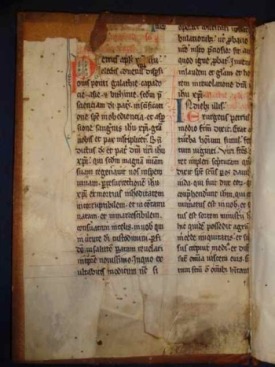"The God of All Grace" -- 1 Peter 5:1-14
 Tuesday, April 26, 2016 at 09:50AM
Tuesday, April 26, 2016 at 09:50AM  The Twelfth and Final in a Series of Sermons on 1 Peter
The Twelfth and Final in a Series of Sermons on 1 Peter
What do you say to Christians who have been displaced from their homes by a cruel and cynical act of a pagan emperor? How do you comfort a persecuted people who see no relief in sight from their troubles? What do you say to people who are reviled and cursed because they profess their faith in Jesus Christ as Creator, redeemer, and Lord, and refuse to worship Caesar or the pantheon of pagan gods? How do you comfort a people who are mocked because they follow the teaching of Jesus, and therefore refuse to indulge every bodily urge simply because those urges exist? If you are the Apostle Peter, you tell them the truth. The reality is that fiery trials come with being a Christian in a pagan environment. Yet, these trials are also the means through which God strengthens our faith. Just as it was with Jesus–that the cross of Good Friday precedes the empty tomb of Easter–so too it is with Christians. Suffering precedes the glory yet to be revealed. Peter also tells them that despite their troubles, God has not cast them off. Regardless of how they feel, those who believe in Jesus are his elect exiles, his spiritual temple, possessing a heavenly citizenship which guarantees all the blessings of eternal life and a heavenly inheritance. Peter also tells them, that Christians must strive to humble themselves before God, and learn to cast all of their cares and worries upon the sovereign God who is also their loving father. As they do so, Christians begin to live in the hope of the eternal glories yet to come.
With this sermon, we wrap-up our series on 1 Peter. Last time, we devoted our attention to several of the points raised by Peter in the final section of this epistle (vv. 1-14 of chapter 5)–specifically Peter’s reference to the office of elder, which functions as a bulwark against the schemes of the devil, the adversary, who is looking for struggling Christians to devour. This morning, we will cover the same ground, but focus upon two different themes in the text–humbling ourselves before God, while at the same time learning to cast all of our cares upon him. This will bring our series on 1 Peter to an end.
Peter wraps up his lengthy series of exhortations (imperatives) to suffering Christians–the elect exiles of the Diaspora of Asia Minor–by directing his audience’s focus away from those external circumstances under which Christians are struggling, to internal and pastoral matters. Before extending greetings to several individuals and concluding his letter, Peter addresses those things the churches and their leaders ought to be doing so as to persevere through difficult times. As we saw last time, Peter begins with an exhortation to the elders of the churches receiving this letter. In verses 1-2, he writes, “so I exhort the elders among you, as a fellow elder and a witness of the sufferings of Christ, as well as a partaker in the glory that is going to be revealed: shepherd the flock of God that is among you, exercising oversight, not under compulsion, but willingly, as God would have you . . .” Jesus is the chief shepherd of his church, and he calls church officers (“elders” and ministers) to shepherd his flock as “under-shepherds.”
The reference to Christ’s church as a “flock,” is a metaphor widely used throughout the Old Testament in reference to those instances where sinful individuals are likened to sheep because of the tendency of sheep to wander away from the flock and place themselves in peril. A sheep which is separated from rest of the flock is completely helpless and likely to become an easy meal for any of the common predators in the area–wolves, jackals, coyotes, or even lions. Apart from a shepherd, who leads and protects them, the sheep are lost, they know not where to go, nor what to do.
To read the rest of this sermon, Click Here


Reader Comments